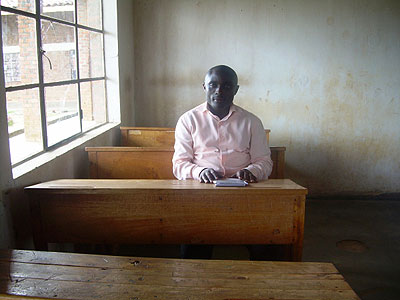The New Times (TNT) sought more clarification on the testimony of Phanuel Sindayiheba (PS) and below are the excerpts.


The New Times (TNT) sought more clarification on the testimony of Phanuel Sindayiheba (PS) and below are the excerpts.TNT: You told us about being in different groups, from different backgrounds, how did you avoid separating yourselves?PS: There are three things that formed the core of our unity. Personal values you should have, but also important is leadership. We had an old man who was our school chaplain, and his motto was, "Do the good things so that evil may be destroyed” and there were some teachers and parents who were good examples, encouraging us to love and help one another. The second is the power of the word of God. I was one of the leaders of a worship group where Catholic, Protestant and whoever else wished, would gather and discuss peace, love and unity among us. We developed a strong bond and after three years, the habit of scribbling hate messages in toilets, which was most prevalent in the first years, had stopped. The third thing is the government policy of unity and reconciliation that encouraged people to live at peace with everybody. TNT: I want to really understand the power of your courage. The Genocide was just a few years back so the wounds were still fresh and there was that bad spirit, how did you manage to summon that courage?PS: I am a Christian and there is this civic education entrenched in me by my family. In my family, we didn’t have problems between Hutu and Tutsi, and during the Genocide, I saw people helping each other so I could not tolerate somebody killing a neighbour. In Senior Five, Helen was also reciting the Bible that night to students, from Romans 8, where it talks about what can separate us from the love of Christ. Is it death? Is it persecution? Is it hunger? Nothing can separate us from God’s love. TNT: Do you ever feel like revenge when you think about that dark night and what happened to your close friends? PS: Think about somebody who killed five, six people, he took responsibility for his actions, served some time in jail, and now he’s back, he has cars and a good house, and there is a Genocide survivor living a deplorable life. Do you think these people can keep living together? At the beginning it’s not that easy, but it’s possible. You know in chemistry what a catalyst is – something that accelerates, a reaction. So, seriously it is hard for them to co-exist. When it comes to reconciliation, the victim plays the biggest part, since the initial stage is to forgive. The survivors of Nyange have been the catalysts and we will continue with all means to educate Rwandans, especially the young generation, to put aside all divisive tendencies and bad ideologies and build on our strength, which is unity of Rwandans. You have to initiate the process, bring people together, help people who could not otherwise live together to do so. TNT: What is your future plan? PS: We intend to maintain what we have already started, ensuring the welfare of The Nyange Heroes and their families, advocating for those that need assistance, and working closely with government institutions, and NGOs to promote the culture of peace building and heroism.


